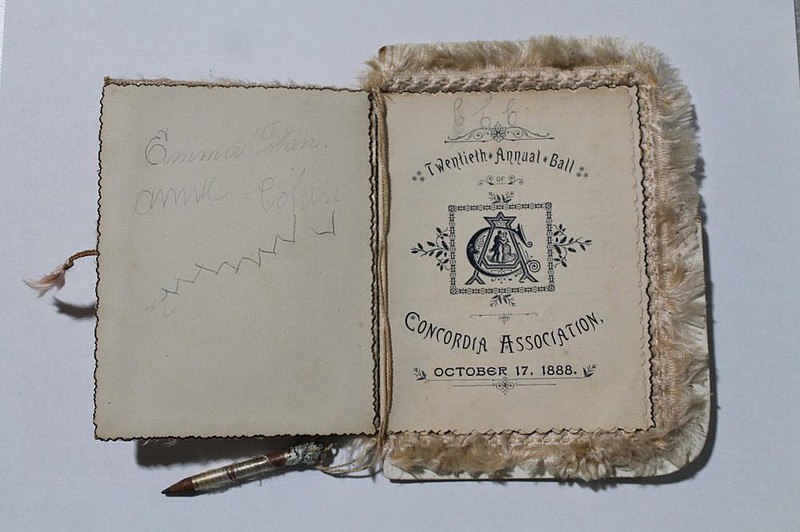Steps from where members of Little Rock's Jewish community once danced, socialized and organized some of the state's earliest Jewish congregations during the 19th century, researchers can now access materials that played a role in those gatherings and gain a sliver of insight into their lives.
The Central Arkansas Library System's Roberts Library in Little Rock recently announced its Concordia Hall collection, a trove of more than two dozen items including programs, dance cards and invitations associated with one of Arkansas' earliest known Jewish social clubs, the Concordia Association.
Harry Ehrenberg Jr., owner of Ehrenberg Financial in Little Rock and a descendant of one of the area's earliest Jewish immigrants, donated the club's event materials in 2017. His great-grandfather, Herman Ehrenberg, was one of the club's organizers.
The association, first known as the Little Rock Club when it was established in 1864, came after growth in the state's Jewish community during the mid-19th century and reflected larger trends in U.S. immigration during that time, according to Carolyn Gray LeMaster's "A Corner of the Tapestry: A History of the Jewish Experience in Arkansas, 1820s-1990s."
Sherry Schuette, archival assistant at Roberts Library, said the club was organized in part because Jews were excluded from other social clubs at that time.
"The merchants, they were generally accepted by the business community, but they weren't accepted ... socially," said Schuette, who processed the collection for preservation earlier this year.
However, the club let non-Jewish groups use the space, and Concordia Hall was noted by LeMaster to have hosted "the most prestigious occasions," including a gala ball in honor of former president Ulysses S. Grant during his visit to the city in 1880.
The use of the Concordia Hall facilities by other groups strengthened relations between the Jewish and non-Jewish communities, LeMaster wrote. Schuette said the club marked the evolution of the faith as a community, as the first Jewish congregations in the state began to organize during the years after the club's formation.
"The decisions that were made to form a ... synagogue, and form a congregation -- the meetings that set that in motion -- happened in the Concordia Hall location," Schuette said. "There were people that were already gathered around the Concordia Association that decided that the group, the community, was large enough that they could support a house of worship. It actually grew out of the gathering that was already there at the Concordia Association."
Max Hilb, a member of the social club in its earlier years, created an event space for the association on the second floor of 409 E. Markham St. when Hilb and William Probst had a building constructed on the site in 1882 for their liquor distribution business, according to LeMaster's research.
The club occupied several locations before constructing a building of its own at Eighth and Scott streets in 1903, according to LeMaster. The Concordia Association later changed its name to Westridge Country Club and erected a building in southwest Little Rock, said Jimmy Phifer, who co-heads the archives of Little Rock's Temple B'nai Israel. He said it would be the club's final location.
The second floor of 409 E. Markham Street would later be remodeled into a second and third floor, eliminating its high ceiling, and would house a series of businesses before Roberts Library bought the building.
That structure is now the Porbeck and Bowman building, one of three that comprises the Roberts Library. It was restored and construction on the two additional buildings was completed in 2009. A plaque on the building's exterior on Markham Street notes the history of the structure, and the Roberts Library named its Concordia Hall Gallery on the library's first floor in honor of the history.
Roberts Library is home to the system's special collections and houses the Butler Center for Arkansas Studies, the system's Galleries at Library Square and the University of Arkansas at Little Rock's Center for Arkansas History and Culture.
Among the most notable Arkansas Jewish history materials it contains are LeMaster's historical papers from her research in writing "A Corner of the Tapestry," considered the most comprehensive reference book on the history of Jews in the state.
Schuette said in processing items for the library's special collections, she always finds an element of particular interest. With the Concordia Hall Collection, she was excited to see the names of prominent Jewish families in the area from that time among the materials, and know that the materials contributed to the history of the building.
"I enjoy the fact that we can bring that information back, and put it out for the public to share," Schuette said.



